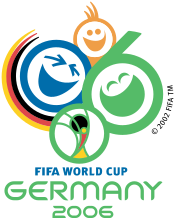The 2006 FIFA World Cup was the 18th FIFA World Cup, the quadrennial international football world championship tournament. It was held from 9 June to 9 July 2006 in Germany, which won the right to host the event in July 2000. Teams representing 198 national football associations from all six populated continents participated in the qualification process which began in September 2003. Thirty-one teams qualified from this process, along with the host nation, Germany, for the finals tournament. It was the second time that Germany staged the competition, the first as a unified country (the other was in 1974 at the then-West Germany), and the tenth time that it was held in Europe.
Italy won the tournament, claiming their fourth World Cup title. They defeated France 5–3 in a penalty shoot-out in the final, after extra time had finished in a 1–1 draw. Germany defeated Portugal 3–1 to finish in third place. Angola, Ghana, Ivory Coast, Trinidad and Tobago, and Togo made their first appearances in the finals. It was also the only appearance of Serbia and Montenegro under that name; they had previously appeared in 1998 as Yugoslavia. In late May 2006, immediately prior to the tournament, Montenegro voted in a referendum to become an independent nation and dissolve the loose confederacy then existing between it and Serbia, with Serbia recognizing the results of the referendum in early June. Due to time constraints, FIFA had Serbia and Montenegro play in the World Cup tournament as one team, marking the first instance of multiple sovereign nations competing as one team in a major football tournament since UEFA Euro 1992.
The 2006 World Cup stands as one of the most watched events in television history, garnering an estimated 26.29 billion times viewed, compiled over the course of the tournament. The final attracted an estimated audience of 715.1 million people

Italy won the tournament, claiming their fourth World Cup title. They defeated France 5–3 in a penalty shoot-out in the final, after extra time had finished in a 1–1 draw. Germany defeated Portugal 3–1 to finish in third place. Angola, Ghana, Ivory Coast, Trinidad and Tobago, and Togo made their first appearances in the finals. It was also the only appearance of Serbia and Montenegro under that name; they had previously appeared in 1998 as Yugoslavia. In late May 2006, immediately prior to the tournament, Montenegro voted in a referendum to become an independent nation and dissolve the loose confederacy then existing between it and Serbia, with Serbia recognizing the results of the referendum in early June. Due to time constraints, FIFA had Serbia and Montenegro play in the World Cup tournament as one team, marking the first instance of multiple sovereign nations competing as one team in a major football tournament since UEFA Euro 1992.
The 2006 World Cup stands as one of the most watched events in television history, garnering an estimated 26.29 billion times viewed, compiled over the course of the tournament. The final attracted an estimated audience of 715.1 million people


Comments
Post a Comment